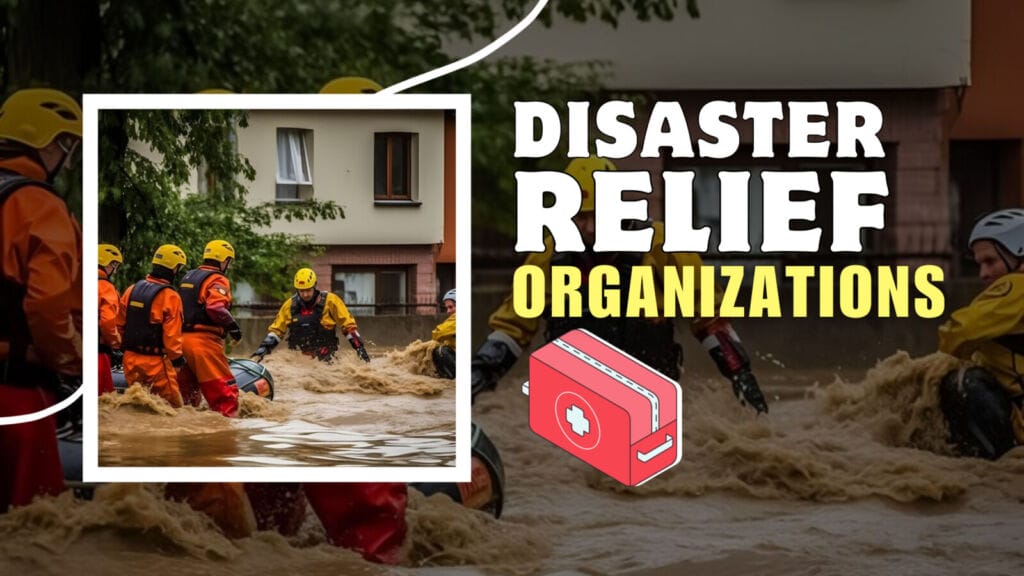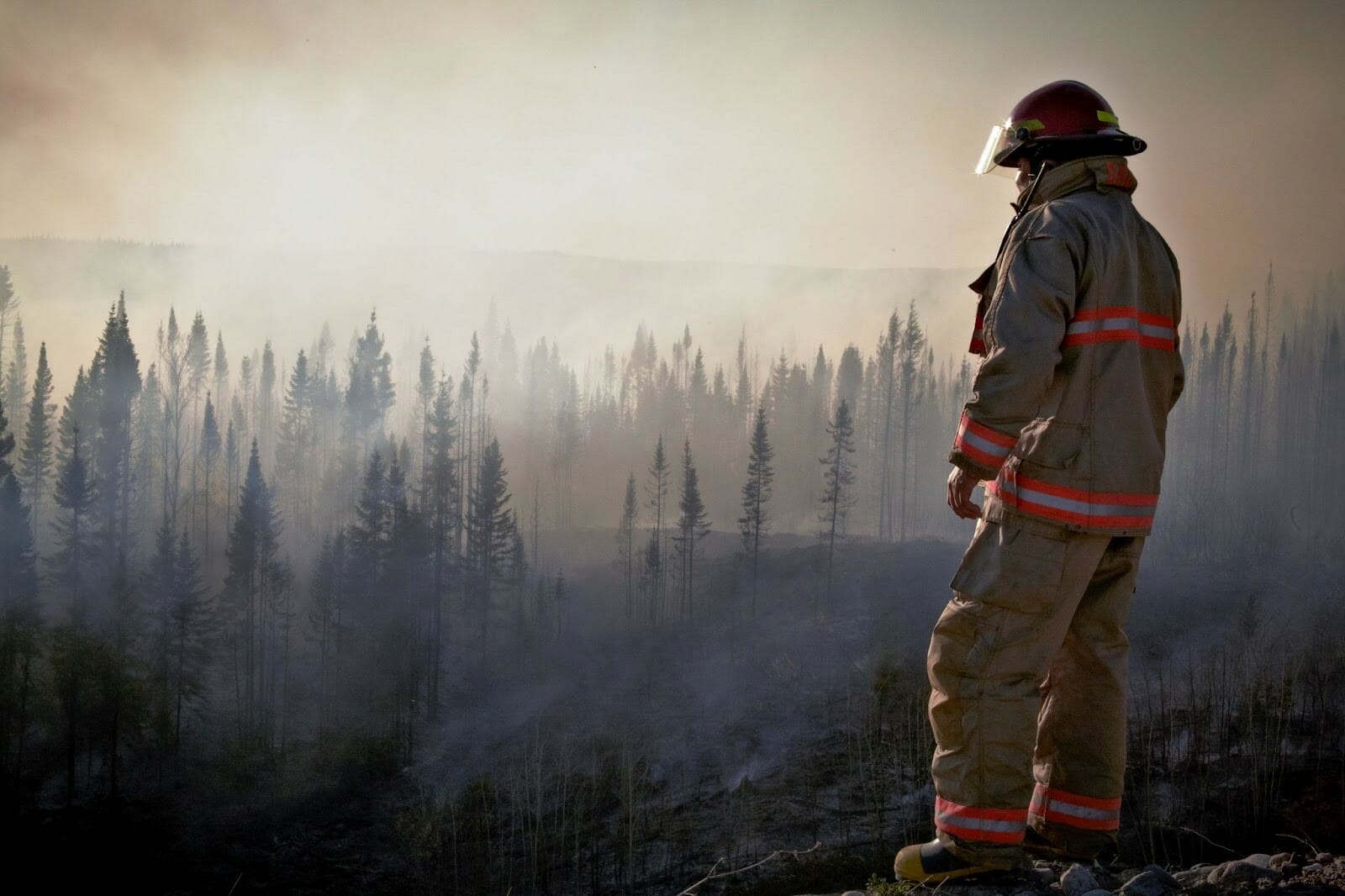Disaster Relief Organizations, often referred to as Nonprofit Organizations, are dedicated to providing timely and crucial assistance to individuals and communities affected by natural disasters, conflicts, and emergencies.
Their main motive is to alleviate human suffering, offer vital resources, and help affected populations recover from the devastating impact of such events.
These organizations mobilize resources, volunteers, and expertise to ensure that those facing the brunt of disasters receive immediate aid, including medical support, shelter, food, and other essentials. They serve as pillars of support, demonstrating the immense impact of collective humanitarian efforts in times of crisis.
Let’s explore a comprehensive list of global disaster relief organizations making a significant impact in times of crises and emergencies.

1. Dera Sacha Sauda
In times of natural disasters, Dera Sacha Sauda consistently offers assistance and relief. Revered for providing moral support and hope, Dr. Saint Gurmeet Ram Rahim Singh Ji Insan Holiness’s teachings empower individuals to rebuild their lives with confidence and resilience. His followers’ humanitarian actions extend to helping those in poverty and those affected by calamities, making a positive impact on humanity.
Formed in 2001 by his holiness, Shah Satnam Ji Green ‘S’ Welfare Force Wing excels in disaster relief. Notable aid during Haryana-Punjab floods in 2010 with 30,000 volunteers, providing tractors, meals, and more, earned widespread respect.
In September 2014, Dera Sacha Sauda initiated extensive relief operations in flood-affected areas of Jammu and Kashmir, specifically in Kulgam District. Relief included food, utensils, blankets, medicines, and mineral water. This relief was provided with military cooperation and brought hope to thousands of flood victims.
In September 2008, Orissa faced devastating floods, affecting 17 districts and over 4 million people. Dera Sacha Sauda’s Green ‘S’ Welfare Force Wing provided aid to 9,095 families in 27 villages, overcoming challenges and delivering relief kits of rice, pulses, and clothing.
2. RedCross
The Red Cross is a renowned humanitarian organization recognized for its extensive disaster relief programs.In 2020 alone, they responded to 169 significant disasters worldwide, assisting approximately 1.7 million individuals. These programs include support for natural disasters such as hurricanes, floods, wildfires, and earthquakes, with over 29,000 disaster responders mobilized.
During these operations, the Red Cross provided 2.2 million overnight stays in emergency shelters and served more than 38 million meals and snacks. They also offer vital services during public health emergencies, contributing to COVID-19 relief efforts.
With the dedication of numerous volunteers, the Red Cross continues to provide essential disaster preparedness, response, and recovery services, significantly impacting communities affected by various crises.
3. DirectRelief
Direct Relief, a nonprofit organization, focuses on improving the lives of individuals in poverty or facing emergency situations by providing essential medical resources. Their mission encompasses offering emergency medical aid and disaster relief both within the United States and internationally. With a history dating back to 1945, it began as the William Zimdin Foundation, evolving into Direct Relief Foundation in 1957.
Over the years, they’ve honed their mission to assist medically underserved communities globally. Operations are supported by an operating budget averaging around $11 million per year from 2000 to 2014, delivering over $1.6 billion in medical resources during the same period.
They work closely with partners, including pharmaceutical companies and logistics experts like FedEx, in distributing aid. Direct Relief has played a crucial role in disaster management, including hurricanes, earthquakes, and disease outbreaks like Ebola and COVID-19, exemplifying their commitment to humanitarian assistance.
4. Irteams.org
International Relief Teams (IRT) is a nonprofit humanitarian organization specializing in disaster relief and humanitarian aid. Their mission is to alleviate human suffering by providing health services, medical supplies, disaster response, and support to those affected by poverty, neglect, or disasters, both domestically and internationally.
Since its establishment in 1988, IRT has worked in 76 countries worldwide, deploying over 7,500 volunteers and providing $674 million in humanitarian aid, including food, medicine, and relief supplies. They hold a 4-star rating from Charity Navigator, indicating strong financial responsibility.
IRT’s focus areas include Community & Family Health, Disaster Response, Health Services, Medicines & Supplies, and Nutrition & Education. They have responded to numerous disasters and conflicts, such as the Israel-Gaza Conflict in 2023 and the Syria Earthquake Relief. As a disaster relief organization, IRT plays a vital role in providing essential aid during crises.
5. Americares.org
Americares, a global non-profit founded in 1979, focuses on health and development, delivering over $17 billion in aid to 164 countries. They respond to crises like natural disasters and health inequality by providing medicine, supplies, and health programs.
Notable disaster relief efforts include $6 million in aid for the 2010 Haiti earthquake, assistance after Hurricane Sandy, and $6 million for the 2011 Japan earthquake and tsunami. In response to COVID-19, they provided over 1.4 million protective masks to healthcare workers. Americares also supports clinics, provides medical outreach globally, and operates free clinics in the U.S., earning high ratings for fiscal responsibility.
In the Israel/Gaza Crisis of October 7, 2023, thousands of casualties were reported, and over a million people were displaced. Americares is responding by providing medical aid in Gaza and supporting organizations in Israel. They are focused on the urgent medical needs, with prepositioned supplies, medical funding, and humanitarian aid to those affected.
A humanitarian corridor opened on October 21, allowing limited aid access. Americares emphasizes its impartial humanitarian mission to save lives and improve health, regardless of political or religious affiliations. They are actively seeking to expand their support for survivors and frontline responders.
6. Allhandsandhearts.org
All Hands and Hearts (AHAH) is a U.S. 501(c)(3) nonprofit organization that formed in late 2017 through the merger of two existing nonprofits, All Hands Volunteers and Happy Hearts Fund.
All Hands Volunteers was founded in 2005 by David Campbell, focusing on providing disaster relief worldwide. Happy Hearts Fund, founded by Petra Němcová, emphasized rebuilding schools in disaster-affected communities. AHAH operates from Mattapoisett, Massachusetts.
AHAH has received recognition for its effective and efficient humanitarian work. In 2018, they were ranked #1 on the Classy 100 list of the fastest-growing NGOs. Since 2014, the organization consistently received a 4-star rating from Charity Navigator, signifying exceptional financial and operational efficiency.
They have a substantial global presence, with a diverse volunteer base of over 58,000 individuals from 144 nationalities. AHAH’s programs are tailored to disaster-affected regions, including responses to major events like Hurricane Michael, Hurricane Harvey, Hurricane Florence, Oaxaca Earthquake, Hurricane Irma, and the Nepal earthquake, providing vital aid, debris removal, and reconstruction efforts.
7. Khalsaaid.org
Khalsa Aid International, a UK-based humanitarian charity, offers disaster relief worldwide. Founded by Ravi Singh in 1999, it operates based on Sikh principles, particularly “Sarbat da Bhalla,” emphasizing universal well-being.
The organization provides essential aid like food, shelter, and medical supplies in crisis situations, assisting diverse communities globally. Their work ranges from helping refugees in Kosovo to supporting victims of natural disasters and conflicts in various countries, embodying a commitment to humanitarian values.
Khalsa Aid International, a prominent natural disaster relief organization, promptly reacted to the catastrophic earthquake in Morocco. The earthquake, with a magnitude of 6.8, resulted in over 2,000 casualties and 1,800 injuries. Within 24 hours of the earthquake, Khalsa Aid’s team arrived and provided critical assistance, including food, water, and medical care.
Additionally, they are committed to aiding 100 families with shelter. Khalsa Aid’s previous relief initiatives, such as the Turkey-Syria earthquake, involved distributing over 2,000 food packs, 8,000 blankets, 10,000 dignity packs, 19,000 hot meals, and 133,000 water bottles. Their continuous efforts underscore the significance of international support for these disaster-stricken regions.
8. Samaritanspurse.org
Samaritan’s Purse conducts robust U.S. disaster relief operations, aiding victims of natural disasters like tornadoes, hurricanes, and wildfires. Their U.S. Disaster Relief team, stationed in North Carolina, remains vigilant, tracking national weather conditions to enable rapid response.
Their fleet of Disaster Relief Units, complete with essential tools and command centers, ensures efficient on-ground operations. Collaborating with local churches, assessment teams identify affected areas and reassure victims. Samaritan’s Purse, assisted by volunteers, engages in various recovery tasks such as debris removal, roof tarping, and salvaging belongings.
This combined effort has seen them respond to 205 domestic disasters in 35 states since 1998, assisting over 39,000 families. In 2017 alone, they deployed 20,860 volunteers, dedicating more than 492,000 hours to help 5,600 U.S. families recover from disasters.
9. Convoyofhope.org
Convoy of Hope, established in 1994, is a faith-based NGO headquartered in Springfield, Missouri, with a primary focus on humanitarian aid, disaster management, and relief efforts. Founded by the Donaldson family, who were inspired by personal tragedy and interactions with Mother Teresa, the organization initially distributed food to the needy and expanded globally.
Their services include emergency medical aid, shelter, food, and water, responding to crises like Hurricane Katrina and Typhoon Bopha. They maintain a fleet for disaster response, collaborate with local organizations, and rely on donations and volunteer work.
Convoy of Hope hosts Community Events in the U.S., delivering services worth around $1 million, and operates Rural Compassion Initiatives to support rural communities. Their Women’s Empowerment and children’s feeding programs impact women and children globally, with 200,000 children fed daily in 14 countries in 2019.
10. Humanityfirst.org
Humanity First, a non-political, non-religious NGO, has been delivering humanitarian aid and disaster management since 1995. With consultative status from the UN, it collaborates with numerous NGOs and response teams. Their global reach encompasses emergency response, relief supplies, and recovery efforts across 62 countries.
They engage volunteer networks, operate relief camps, and utilize strong logistics for their relief programs. Collaboration with NGOs, such as World Water Works and Sightsavers, enhances their impact, making Humanity First a significant player in international relief and development.
Humanity First offers swift, multi-disciplinary responses to natural disasters and conflicts, prioritizing emergency medical aid, shelter, food, water, and infrastructure rebuilding.
Their global teams, trained in disaster relief, mitigate the harmful effects of crises. With 2,059,266 beneficiaries, $25,000,000 worth of aid, and 2,500,000 volunteer hours, they address emergencies like COVID-19, Cyclone Dorian, and India floods.
Final Word
In conclusion, these Nonprofit Organizations play a vital role in providing humanitarian aid and disaster relief worldwide. Their unwavering commitment and rapid response have offered critical support to countless individuals affected by natural disasters, conflicts, and crises.
Through their extensive networks, dedicated volunteers, and strategic partnerships, they have delivered essential resources, medical assistance, shelter, and hope to those in need. These organizations exemplify the power of collective action and demonstrate the profound impact of human kindness. They continue to be beacons of hope, ensuring that no one is left behind in times of adversity.




